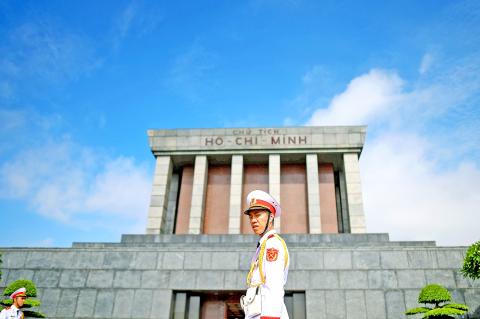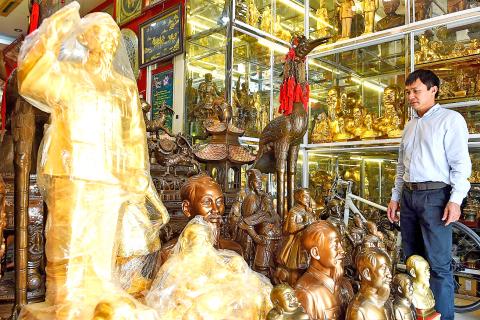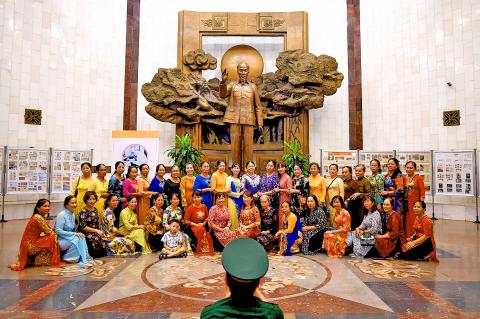The task of safeguarding the embalmed body of Vietnam’s revolutionary leader Ho Chi Minh is grueling: carefully-selected riflemen work around the clock, watching over the communist nation’s founding father who died on Sept. 2 50 years ago.
Protecting him is the ultimate patriotic service for men in stiff white uniforms at Ho’s towering tomb in Hanoi, a monolithic shrine to a man who still pervades public life despite his fading relevance among the youth. The job is a “dream come true” for guard Nguyen Xuan Thang, even if it’s not always easy.
All year round, he works up to four two-hour shifts every day — often outside the tomb in the blistering summer heat, monsoon rains, or frigid winter weather. Some days he works inside the cool, dark chambers where Ho’s waxy body — his wispy goatee beard still intact — is on display for daily pilgrimages by thousands of schoolchildren, tourists and war veterans who come to pay their respects.

Photo: AFP
照片:法新社
Even after hours, Ho is never alone: soldiers flank his encased body 24 hours a day. Guards like Thang aren’t the only ones tasked with looking after Uncle Ho, as he is affectionately known in the country. A team of four Russian and seven Vietnamese scientists were hired this year to evaluate his embalmed body ahead of the 50th anniversary on Sept. 2.
Ho did not live long enough to see the end of the war in 1975, when North Vietnamese tanks rolled through the former southern capital Saigon, later renamed Ho Chi Minh City. But Ho did deliver clear burial plans in his will: a request to be cremated and have his ashes modestly displayed in north, central and south Vietnam in a sign of symbolic unity. “There should be no stone stele or bronze statue,” but rather a small ceramic urn on three tree-lined hills for visitors, he wrote in his will.
However, eager to capitalize on the popularity of the north’s communist leader, his aides chose instead to build a grand tomb, drawing inspiration from Lenin’s mausoleum, the pyramids in Egypt and the Washington Monument. The powerful symbol of Ho Chi Minh continues to be commandeered today by Vietnam’s communist leaders; his teachings are invoked in school curricula, political and military training, children’s books, patriotic songs and on propaganda billboards.

Photo: AFP
照片:法新社
For Vietnam’s booming young population, Ho figures as a distant historic character, far removed from the thriving capitalism, ubiquitous social media and yearning for freedom that preoccupies most of the smartphone-obsessed youth today. For Ho’s dutiful minders, the communist leader remains a central focus. Thang and his team busily prepared for an official wreath-laying ceremony for Ho held Friday, and expected visitor numbers to surge last Monday for the anniversary of Ho’s death, which also happens to be National Day.
(AFP)
鎮守越南革命領袖胡志明的防腐遺體是件辛苦的任務:精挑細選的步槍兵全天侍衛在旁,照看著這個共產國家的國父,他在週一度過逝世五十周年。

Photo: AFP
照片:法新社
對於身穿硬挺白色制服、駐守於此的兵士而言,保護胡志明是終極的愛國勤務。這座高聳陵墓位於河內,是一座巨石建成的聖殿,紀念這位在公共生活中處處可見的偉人,儘管其人與年輕世代的關聯性正在逐漸消逝。對衛兵阮春勝(音譯)來說,這份工作可說是「夢想成真」,雖然沒那麼輕鬆。
一整年中,阮春勝每天執勤的次數多達四班,每班兩個小時──在酷暑中、季風雨中、嚴寒的冬日天氣中站在陵墓外守衛都是家常便飯。有幾天他會到涼意襲人又陰暗的室內值勤,裡面擺放著胡志明蠟像般的遺體──他那撮山羊鬍仍然保存完好無缺──向絡繹不絕的朝聖者展示。每天都有數以千計的學童、遊客、退役老兵來到此地致敬。
就算在開放時間結束後,胡志明也從來不會獨自一人:一天二十四小時都有士兵站在裝於棺中的遺體兩側。像阮春勝這樣的衛兵也不是唯一被指派來照看「胡伯伯」──越南人深情地這樣稱呼他──的人。今年,在九月二日胡志明逝世五十周年之前,越南聘請了一組由四名俄國科學家與七名越南科學家組成的團隊,檢視胡志明防腐遺體的保存狀況。
胡志明活得不夠久,沒能看到一九七五年越戰結束,北越坦克長驅直入西貢,而這座前南越首都重新被命名為胡志明市。不過,胡志明在遺囑中明確地傳達他的身後事安排:他要求遺體火化,骨灰低調地分開於越南的北、中、南三處展示,作為象徵全國統一的標記。他在遺囑中寫道:「不要設立石碑或銅像」,只要在樹木林立的三座丘陵各放一個小陶瓷骨灰罈,供人懷念。
然而,胡志明的心腹熱切想要利用這位北越共產黨領導的人氣,決定興建一座雄偉的陵墓,格局仿效列寧墓、埃及金字塔,以及華盛頓紀念碑。這個強而有力的胡志明象徵,至今仍然被越南的共產黨領導人們所利用;學校課程、政治與軍事訓練、童書、愛國歌曲,以及政治宣傳看板,一再召喚著胡志明的教導。
對越南快速成長的年輕人口而言,胡志明的角色卻像是遙遠的歷史人物,疏離於蓬勃發展的資本主義、無所不在的社群媒體,以及今日沉迷於智慧型手機的年輕人對自由的渴求。對胡志明盡責的保鑣們來說,這位領導人仍然是他們的焦點。阮春勝和他的同事們上週五忙著準備為胡志明舉行的官方獻花儀式,並且預期隔幾天後的週一訪客人數將會激增,因為當天既是胡志明的逝世紀念日,同時也是越南國慶日。
(台北時報章厚明翻譯)

The phenomenon of being “tea drunk” is a unique experience often associated with this popular beverage, especially when consuming brews that are particularly high-quality or strong. Unlike being drunk on alcohol, the effects of tea drunkenness stem from various compounds found in tea leaves. __1__ These substances can have a synergistic effect on the brain, resulting in a state of euphoria, relaxation, or heightened sensory awareness. __2__ One of the most obvious is the caffeine present in tea. It acts as a stimulant that increases alertness and cognitive function. Unlike coffee, however, tea also contains L-theanine, an amino acid

A: The 2024 BWF World Tour Finals just kicked off in Hangzhou, China yesterday. B: Only the world’s top 8 players and Olympic gold medalists are qualified for the annual games. A: Taiwan’s badminton duo, Lee Yang and Wang Chi-lin, won the Olympic gold. Did they qualify? B: Of course. This will be the “Lin-Yang duo’s” last dance. A: Taiwan’s badminton king Chou Tien-cheng, men’s doubles, Yang Po-hsuan and Lee Jhe-huei, and mixed doubles, Yang and Hu Ling-fang, will also compete this time. It’s sure to be awesome. A: 2024世界羽聯「BWF年終總決賽」,昨天已在杭州開打了。 B: 只有世界前8名選手,或奧運金牌才有資格參賽。 A: 台灣的李洋、王齊麟榮獲奧運男雙金牌,也可以參男雙賽囉? B: 當然啦,而這次將是「麟洋配」的最後一舞! A: 而台灣球王周天成,男雙楊博軒、李哲輝,混雙楊博軒、胡綾芳也將參賽,讚啦。 (By Eddy Chang, Taipei Times/台北時報張聖恩)

A: Taiwan has won three golds at the BWF World Tour Finals in the past. B: Cool, who were the gold medalists? A: Badminton queen Tai Tzu-ying won gold in 2020 and 2023, and men’s double, Lee Yang and Wang Chi-lin, won the title in 2020 as well. B: It’s too bad that both Tai and Lee announced their retirement from badminton. A: Hopefully, Wang and his new partner — the 21-year-old, 189cm-tall Chiu Hsiang-chieh — can also perform well in the future. A: 台灣在「BWF年終總決賽」,曾3度奪金耶。 B: 真酷耶,是誰啊? A: 戴資穎在2020、2023年度的女單,李洋、王齊麟在2020年的男雙都曾奪金! B: 不過小戴、李洋已宣布,要從羽壇退休。 A: 希望王齊麟和新搭檔—21歲189公分的邱相榤—未來也能打出好成績。 (By Eddy Chang, Taipei Times/台北時報張聖恩)

Continued from yesterday(延續自昨日) https://www.taipeitimes.com/News/lang __3__ These generally include a sense of calm, mental clarity and a mild feeling of euphoria. Some people may also experience a light-headedness, giddiness, or a heightened appreciation for the flavors and aromas of the tea they are drinking. __4__ All these are signs that one should reduce their tea intake. It is essential to understand the balance between the beneficial and adverse effects of tea. Becoming tea drunk shows the potency of the natural compounds in tea and their impact on human physiology. Moreover, it highlights the complicated relationship between what we consume and how it